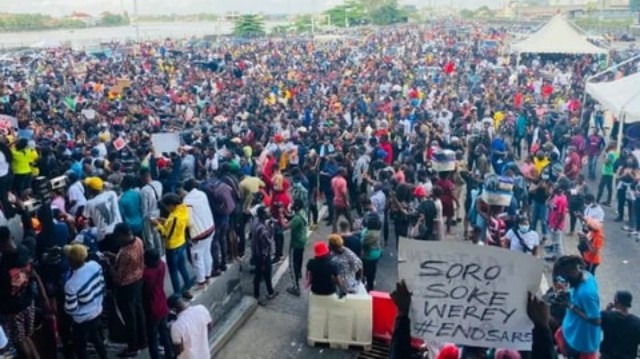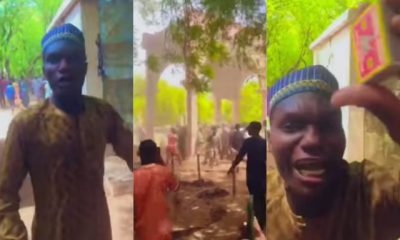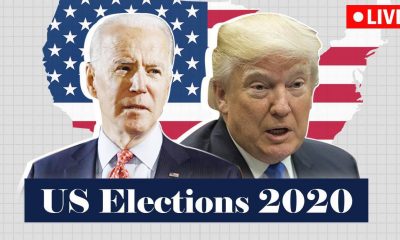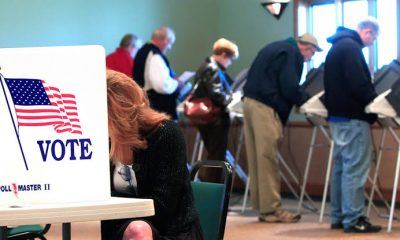Opinion
The Peaceful Protest And The Hidden Truth

By Raymond Oise-Oghaede
The #ENDSARS protest that rocked the country some days ago could be said to be one of its kind in the history of Nigeria as a sovereign nation. It commanded a huge followership and also attracted supports from every nook and cranny of the polity and the diaspora. The protest was generally peaceful and effective until there were reported cases of clashes between the protesters and some anti-protest groups who tried to stop the campaign. At a point, there were pockets of violence in some parts of Lagos which led to the imposition of curfew by the state government on 20th October. The curfew which was initially slated to commence by 4.00 PM was later shifted to 9.00 PM to enable people get to their various destinations. Shortly after nightfall, the social media and some TV/Radio stations were abuzz with the news and videos of shootings by men in military fatigues at the Lekki Toll Gate; and, that some innocent protesters were killed in the unprovoked attack. As a law abiding and responsible citizen, I cannot confirm or debunk the veracity of the video clips and reports because I was not physically present at the scene and I do not have the capacity to give forensic or expert opinion on the alleged clips of the scenario. Notwithstanding, I can safely take a position that “if the allegations are confirmed to be “true”; then, the action (at least at that location where there were no reports of violence prior to the attack) was “unjustifiable” and “condemnable”. However, since an independent judicial panel has been set up in the state on the matter, I am of the opinion that the best we can do is to allow them carry out thorough investigations and come up with their findings. Thus, the aim of this review is without prejudice to the terms of reference of the panel; but, to focus on the intricacies of the subject matter (peaceful protest); identify some key factors that most people take for granted and which could change the “narratives” and “turn” a hitherto legitimate and constitutionally guaranteed right to “an unlawful and criminalized act”. It is expedient to resolve this complicated issue once and for all so that we will not continue to “protest in vain”.
There is needless to say that the Lekki incident has been attracting condemnations from far and near because the protest at that arena was very peaceful; so, why should anybody or the government forcefully stop or disperse the protesters while exercising their constitutionally guaranteed right that is expressly written and codified?. For instance, Section 40 of the 1999 Constitution of the Federal Republic of Nigeria (as amended) provides that “every person shall be entitled to assemble freely….”; Article 21 of the 1966 International Covenant on Civil Rights (ICCPR) which governs the right of peaceful assembly also states that “the right to peaceful assembly shall be recognized…”; and, Article 11 of the 1981 African Charter on Human and Peoples’ Rights further provides that “every individual shall have the right to assemble freely with others”. So, what was wrong with the #ENDSARS protest that warranted the use of “the military” to “quell”? In order to resolving this puzzle, there is need to take a closer look at the provisions of the above stated “enabling laws” which clearly show that certain “restrictions and derogations” were attached to “weaken” the “absoluteness of the right to peaceful assembly/protest”.
In the case of the 1999 Constitution, the limitation to the right in Section 40 could be found in Section 45 (1) which states that “Nothing in sections 37, 38, 39, 40 and 41 of this Constitution shall invalidate any law that is reasonably justifiable in a democratic society – (a) in the interest of defence, public order, public morality or public health; or (b) for the purpose of protecting the rights and freedom of other persons”.
Also, Article 21 of the 1966 International Covenant on Civil Rights (ICCPR) further provided that “No restriction may be placed on the exercise of this right other than those imposed in conformity with the law and which are necessary in a democratic society in the interest of national security or public safety, public order, the protection of public health or morals or the protection of the rights and freedom of others”; while, Article 11 of the 1981 African Charter on Human and Peoples’ Rights concludes that “the exercise of this right shall be subject only to necessary restrictions provided for by law in particular those enacted in the interest of national security, the safety, health, ethics and rights and freedom of others”.
Furthermore, it is also expedient to ascertain if all the requirements provided by the legal framework on the use of force during assemblies (i.e. the 1990 United Nations Basic Principles on the Use of Force and Firearms by law enforcement officials) were taken into consideration before force was employed. By this, it means that, though, the laws frowned at the use of “force” in the dispersal of non-violent but unlawful assemblies; they permit the use of “same” when it is “reasonably necessary”. Thus, if it is found out that “excessive, unreasonable and unjustifiable force” was applied in this case; then, the perpetrators and sponsors of such “heinous act” must be brought to book to serve as deterrent to others. The same treatment should also be meted out to those who partook in the destruction of properties and caused the death of men of the police force and other innocent persons during the protest.
From the aforesaid, it is obvious that, though, the issue of right to peaceful assembly/protest sounds very clear and simple; it is a very “complex concept” that needs to be handled tactfully. As we have ascertained earlier, a lawful peaceful assembly/protest could become “criminalized” and “unlawful” if it encroaches on the “legal rights of other citizens”. For example, Section 41 of the 1999 Constitution provides that “every citizen of Nigeria is entitled to move freely throughout Nigeria…”; so, in a situation where protesters block major roads and prevent free movements of other citizens from one place to the order; the “lawfulness and justifications” of the perceived peaceful protest become “invalidated” because “you cannot remedy a wrong with a wrong”. That is the reason why “you must go to equity with clean hands”. The irony is that though the protest might have been staged for the benefits of the suffering masses, the action becomes unlawful and criminal, if a section of the “same masses” raise objections about the encroachment on their fundamental right to move freely in the country. It will not be a surprise if some citizens and or the government also “tender death certificates of people that lost their lives as a result of their inability to get to the hospital or get medical facilities on time due to heavy traffic occasioned by the blockage of major roads” during the “peaceful protest”.
In the same vein, the several clashes between the protesters and the anti-protest groups provided the government with an “excuse on a platter of gold” to step-in to “prevent” such conflicts from degenerating to public unrest. As a result, it is logical to posit that the protest was effective to the extent recognized by law before it was tainted with illegality and criminality. However, in as much as the original conveners and supporters could religiously swear that there were no ulterior motives in their agenda; their “constitutionally guaranteed right and noble objectives” were “eventually criminalized” by the above mentioned “factors”. To every discerning mind, it is very obvious that protest can “only” be said to be “legal and rightful” if it is “extremely peaceful”; “orderly”; “not encroaching on the rights of others”; and, “not promoting or instigating anything that could undermine the territorial integrity of the country”. Therefore, it means that “peaceful protest” will be very difficult to sustain for “too long a time” in our clime; because, it will be very “easy” to throw spanner into the works by “pushing” the protesters to “overstep the legal limit of their fundamental right” (through several subtle means).
From the aforementioned, it is very obvious that embarking on protests to achieving our dream of a better Nigeria would be very difficult and tortuous. Democracy has handed us the most potent and effective weapon to ensuring good governance; and, that is through the use of our PVCs. So, let no one deceive us that we can “easily change” a democratically elected government through “protests” or “civilian revolution”. Revolution can “only be successful” if the “military compromised their loyalty to the government and the territorial integrity of the nation; or where there is vested interest and support from external country with superior military might. The same thing applies to any plan for “secession”; except, such is achieved through successful referendum which could take “forever” because of the intricacies involved. So, the bitter truth about all these cries or agitations for dismemberment would be very difficult and near impossible to attain; except, the government in place (at any given time) is agreeable and comfortably disposed to making such come to fruition. That is the more reason why the international community cannot just sanction or openly support the disintegration of “a sovereign state”. The elites that are supposed to enlighten “us” (the people) about the complexities of the concepts are either not doing the needful or they are not doing enough.
Consequent, upon the fore going, I wish to advise the electorates to take “election matters” very seriously. It is only when we take up our civic rights (as expected) that we can be in a vantage point to “electing” our choice candidates into positions as “true representatives of the people”; otherwise, we will have to make do with the “stooges” that the “god fathers and power brokers will continue to impose on us”. So, if you do not already have your PVC, ensure you register and collect yours during the next update of voters register by INEC. “It is the most potent weapon that we should all have in our possession to enable us “hire” and “fire” our elective office-holders.
Let’s join hands together to conscientise our electorates on the need to making the “Emerging New Nigeria” a dream come true with our “votes” in due course. We should all ensure that the labour of our heroes past and the present generation must not be in vain.
Long live the Federal Republic of Nigeria.
Raymond Oise-Oghaede writes from Suru-Lere, Lagos State, Nigeria. He can be reached via raymondoise@yahoo.com.









